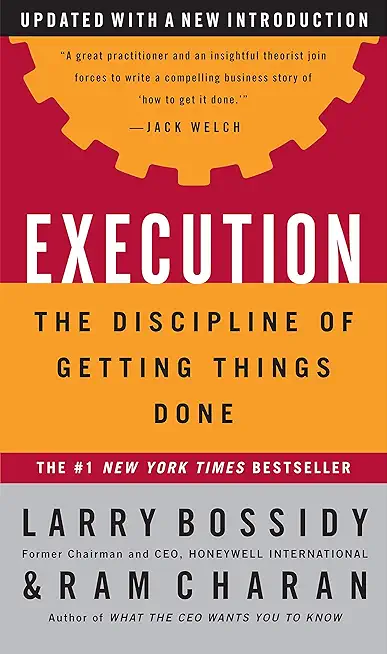
Tribes – Seth Godin

The Discipline of Market Leaders – Michael Treacy & Fred Wiersema
Title: Execution: The Discipline of Getting Things Done
Author: Larry Bossidy & Ram Charan
Main Idea
Execution focuses on the critical importance of translating strategy into action and making sure that plans are effectively implemented to achieve organizational goals. It underscores that execution is a systematic discipline, an integral part of leadership, not just a gap in management.
Key Points
-
Execution is a Discipline:
- Execution should be viewed as a core leadership discipline that requires specific skills and ongoing commitment.
- Leaders must develop and sustain a culture where execution is a priority, not an afterthought.
-
The Link Between People and Strategy:
- Getting the right people in the right jobs is fundamental to successful execution.
- Leaders must be deeply involved in surrounding themselves with talented individuals who can help drive the company’s strategies forward.
-
Know Your Business:
- Leaders need to have a thorough understanding of their business operations and the realities on the ground.
- This knowledge enables them to set realistic goals and anticipate challenges in execution.
-
Establish Clear Goals and Priorities:
- Successful execution depends on clearly articulated goals, prioritizing resources and efforts around them.
- Ambiguity in goals leads to confusion and weak performance in follow-through.
-
Build a Culture of Accountability:
- Accountability is critical; individuals at all levels must take responsibility for their part in execution.
- Regularly review progress and confront reality, adjusting plans as necessary to maintain momentum.
-
Effective Communication is Key:
- Open, honest, and frequent communication ensures alignment and clarifies expectations across the organization.
- Leaders must communicate the importance of execution and facilitate discussions about what is working and what is not.
-
Rewards and Consequences Matter:
- Firms should reward those who deliver on commitments and address poor performance promptly.
- This reinforces the seriousness of execution and motivates consistent follow-through.
-
Execution Requires Continuous Improvement:
- Execution is an ongoing process that requires leaders to remain vigilant, learn from experiences, and refine processes continuously.
- Adaptability and perseverance are vital in sustaining effective execution over time.
Review
- The authors provide a practical roadmap to close the gap between aspirations and results, stressing that leadership’s role in execution is hands-on and relentless. The book makes it clear that execution should be integrated into the company’s daily activities, not treated as a separate initiative.
- Rich with real-world examples, it challenges leaders to embrace execution as the vital link to achieving strategic success rather than assuming plans will materialize on their own.
Recommendation
- This book is a must-read for executives, managers, and entrepreneurs who want to sharpen their leadership capabilities and foster a results-driven culture that converts ideas into impactful action.

